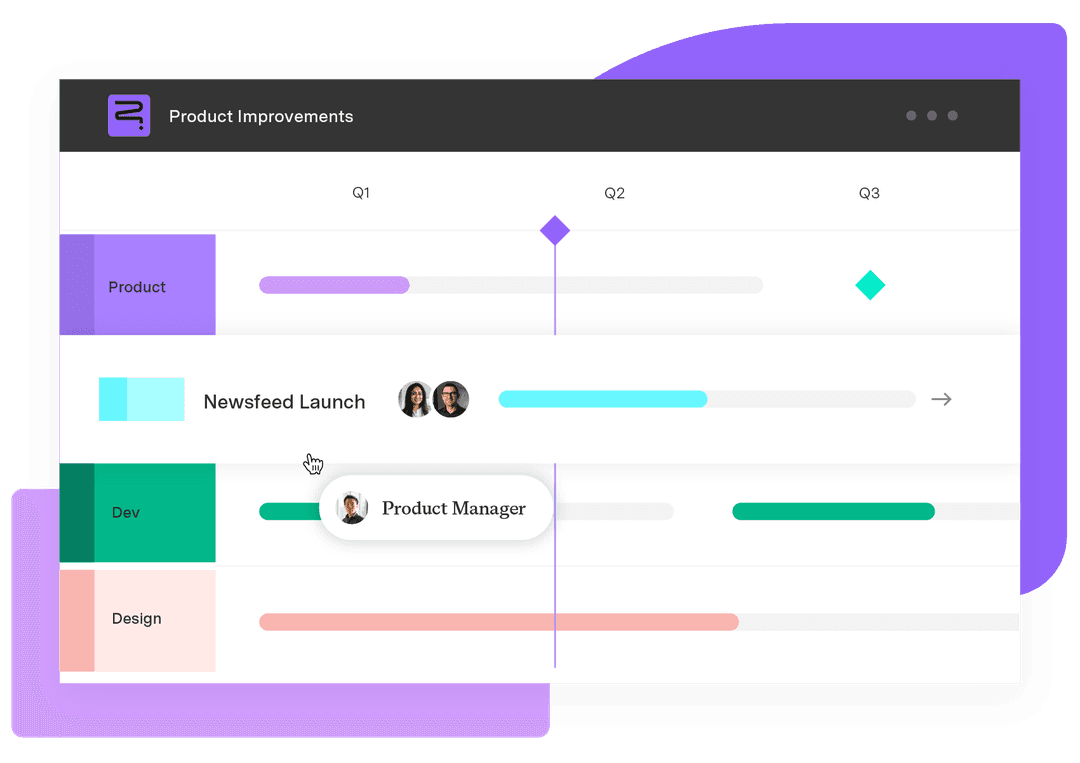Transforming your strategic vision into an actionable roadmap
Tempo Team
A strategy’s true value isn’t in its existence but in its execution. A well-articulated roadmap serves as both a visionary blueprint and a dynamic tool for operational execution.
Leaders who steer organizations or multi-tiered departments have to ensure that teams function as strategic partners. They should be contributors to the enterprise vision – not just tactical units focused on their own goals.
Achieving this level of alignment is tough, but there’s no better place to start than with your roadmap. It should be clear, concise, customizable, and actively synchronized with team outputs. It must also be communicated to department heads, enabling each team to see how their initiatives dovetail with broader enterprise goals.
Executing the roadmap
To effectively deliver on your strategic vision, each initiative in the roadmap should manifest as concrete tasks, projects, and deliverables for each team.
Roadmaps should be integrated into your project portfolio management (PPM) solution so you can translate your strategic vision directly into actionable steps.
Prioritizing what matters
A roadmap often includes more initiatives than can be realistically tackled at once. How do you stay agile and determine which are most critical to your objectives?
Use metrics that matter: Align tasks and projects with KPIs that directly relate to your objectives.
Lean into value vs. effort analysis: Some tasks may be quick to complete but offer massive value. Others might be labor-intensive with little payoff. Knowing the difference can guide your team's focus.
Incorporate team insights: Frontline staff often have a unique perspective on what will bring the most value to the end customer, or streamline a given process.
Communicate and stay the course: Strategic roadmaps guide the journey, but effective communication puts wind in your sails. Utilize PM tools, embrace visualizations, and ensure real-time data flows up and down your enterprise.
Adaptability
Circumstances always change, and your strategy has to be flexible enough to adapt. Success hinges your your ability to adjust the plan in real-time while making improvements. Try these tips to stay nimble:
Maintain strategic agility: Implementing agile principles at scale allows for flexibility in high-level business objectives and investment priorities.
Adapt around triggers: Establish a governance framework that specifies the conditions or triggers for strategic shifts. Examples could be metrics-based, event-based, or time-based.
Use enterprise analytics platforms: Utilize robust analytics platforms capable of handling big data to inform your adaptive strategies. Use real-time analytics to measure progress and outcomes – don’t wait for a quarterly review to make changes if something isn’t working.
Continuous improvement: Large organizations that adopt frameworks like SAFe or LeSS should follow these principles to keep the enterprise agile at any scale:
Synchronize sprints and reviews across teams. Centralize backlog prioritization to align with broader goals.
Incorporate KPIs that reflect both team and enterprise objectives. Use automated dashboards to roll up these metrics from the grassroots to the leadership level, fostering alignment and transparency.
Consider cross-functional committees or 'guilds' to provide diverse perspectives and better decision-making at scale.
This holistic approach helps you adapt swiftly to market changes and internal shifts, keeping you on the cutting edge. Make sure to open up channels for feedback from teams so you can quickly identify when a pivot may be needed.
Sign up for a demo
RegisterTempo for enterprise agile planning (EAP)
Your software stack can make or break your plans. Tempo provides a suite of solutions that over 30,000 organizations use for strategic roadmapping, resource management, time tracking, and bringing strategies to life:
Strategic Roadmaps for roadmapping
Essential for long-term planning and strategic alignment, roadmapping tools help you visualize the journey ahead. Strategic Roadmaps is a standout option, offering features like drag-and-drop functionality, scenario planning, and robust collaboration options.
Structure PPM for issue tracking
For teams using Jira, and for Tempo fans in particular, Structure PPM is the solution of choice. It offers high-level views of all your initiatives, resources, and timelines, enabling strategic decision-making.
Portfolio Manager for predictive scheduling
Teams can manage uncertainty using a unique project management tool that dynamically adapts to change.
Data visualization tools
For Jira and Tempo users we recommend Custom Charts, an easy to use but powerful visualization tool.
Resource management software
Software focused on managing resources can assist in allocating human, financial, and material resources more efficiently. Tools such as Timesheets, Financial Manager, and Capacity Planner are used by a third of the Fortune 500 to better manage resources.
One way to turn a vision into an actionable strategy is with Strategic Roadmaps, and Jira and Tempo Structure PPM. This integration aligns goal setting with strategic roadmapping all the way through to completion.
For organizations not using Jira, Roadmaps also integrates with Tempo Portfolio Manager, providing the additional power of predictive scheduling.
With the right mindset, strategies, and tools in place, you can navigate the new year with confidence and agility.
Make sure to read the full Roadmap to 2024 guide, where we walk through setting a vision and goals, understanding the landscape, and implementing agile principles.













































